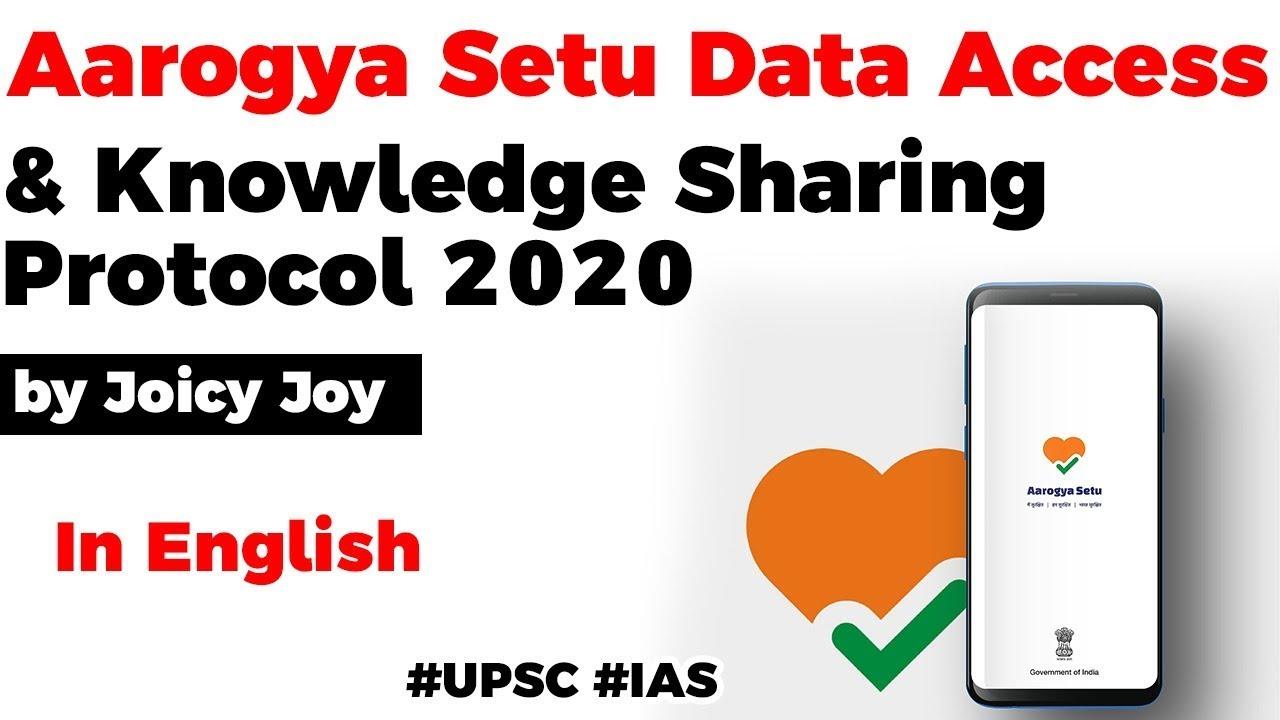Table of Contents
- Recently, the Ministry of Electronics and Information Technology (MeitY) has issued ‘Aarogya Setu Data Access and Knowledge Sharing Protocol, 2020’
- Lays down guidelines for sharing such data with government agencies and third parties amid Covid-19 pandemic.
BACKGROUND
- The executive order issued came amid concerns and privacy issues expressed by a number of experts over the efficacy and safety of the app.
Aarogya Setu App
- Launched by the Ministry of Electronics and Information Technology.
- It will help people in identifying the risk of getting affected by the Coronavirus.
- It will also help to calculate risk based on the user’s interaction with others, using cutting edge Bluetooth technology, algorithms and artificial intelligence.
- Once installed in a smartphone, the app detects other nearby devices with Aarogya Setu installed.
- The app will help the Government take necessary timely steps for assessing risk of spread of Covid-19 infection and ensuring isolation where required.
GUIDELINES
- Intends to ensure that data collected from the app is gathered, processed and shared in an appropriate way.
- The violation of the protocol will lead to the penalties under the Disaster Management Act, 2005.
- MeitY is designated as the agency responsible for the implementation of this Protocol.
- Further, the app’s developer, National Informatics Centre (NIC) shall be responsible for collection, processing and managing response data collected by the Aarogya Setu app under this Protocol.
- Further, it also calls for the Empowered Group on Technology and Data Management to review the protocol after six months; unless extended. It will be in force only for six months from the date of its issue.
- Empowered Group of Ministers (EGoM) is a Group of Ministers (GoM) of the Union Government appointed by the Cabinet or the Prime Minister for investigating and reporting on such matters as may be specified.
- These EGoMs are also authorised to take decisions in such matters after investigation.
- Definition of Individual:
- Data pertaining to individuals is urgently required in order to formulate appropriate health responses for addressing the Covid-19 pandemic.
- Individuals means persons who are infected or are at high risk of being infected or who have come in contact with infected individuals.
- Categorisation of Data:
- The data collected by the Aarogya Setu app is broadly divided into four categories—
- Demographic Data: It includes information such as name, mobile number, age, gender, profession and travel history.
- Contact Data: It is about any other individual that a given individual has come in close proximity with, including the duration of the contact, the proximate distance between the individuals and the geographical location at which the contact occurred.
- Self-assessment Data: It includes the responses provided by that individual to the self-assessment test administered within the app.
- Location data: It comprises the geographical position of an individual in latitude and longitude.
- The demographic data, contact data, self-assessment data and location data are collectively called as response data.
- Ground for Data Sharing:
- The data can be shared only if it is strictly necessary to directly formulate or implement an appropriate health response.
- It can also be shared for appropriate research work.
- Allowed Entities to Access Data:
- Health Ministry, Health Departments of State/Union Territory governments/local governments, National and State Disaster Management Authorities, other ministries and departments of the central and state governments, and other public health institutions of the central, state and local governments.
- Third parties that include the Indian universities or research institutions and research entities registered in India.
- De-identified Form:
- Except for demographic data, the response data must be stripped of information that may make it possible to identify the individual personally.
- De-identification is the process used to prevent someone’s personal identity from being revealed.
- Stripped information must be assigned a randomly generated ID.
- The Protocol also discourages reversal of de-identification and imposes penalties under applicable laws for the time being in force.
- Maintenance of the List: The NIC needs to maintain a list of, the agencies with the time at which data sharing was initiated, the categories of such data and the purpose of sharing the data.
- Data Retention: Any entity with which the data has been shared shall not retain the data beyond 180 days from the day it was collected.
Concerns
- Need for a Personal data protection law
- The Personal Data Protection Bill 2019 is in the process of being approved by Parliament.
- The clause for data sharing with third parties is open ended and has a highest possibility of being misused.
- The process of de-identifying the data should have been detailed, given that reversing de-identification was not difficult.
Latest Burning Issues | Free PDF






















 WhatsApp
WhatsApp